
Satellite image of Michaela Community School. (Source: Google Maps)
Currently there is a court battle between a London state school with close connections to the Tory party and to its allied think tanks and some of its own pupils. The battle started when a group of Muslim pupils decided to hold the compulsory daily prayers on school grounds, presumably during lunch or afternoon break, and were prevented from doing so by staff. The school’s defence was the most recent chapter in the court case, and as a result the media is full of the school’s claims as I write (some of the articles include copy-pasted words from the school’s press release) and these include accusations of ‘threats’, ‘intimidation’, ‘racism’ and a bomb hoax. The school, run by Katherine Birbalsingh, best known for her speeches at the Tory party conference and the more recent “National Conservatism” conference, was allegedly a nice happy family until a few troublemakers decided to ruin things last year by praying on their blazers in their sorry excuse for a playground; there are rumours that the girl who started wearing hijab was a serial troublemaker who may have been “exposed to something” at home. So, let’s have a look at some facts about this.
First: a brief look at this ‘school’ shows us that it is not actually a school. It’s an office building shared with (of all things) a firm of immigration solicitors among probably other businesses. It has next to no outdoor space for pupils; satellite imagery shows a court for some ball game drawn on the grounds between the building and the road, but that’s about it. When Birbalsingh claims in her press release that “the school’s restrictive building” means pupils cannot be allowed to “wander round unsupervised” and that this is an excuse not to have a prayer room, she is talking about something she knew about before choosing that site for her school (much as she knew about the diversity of the area). Of course, it’s not the only time a building has been repurposed as a school that had previously been, say, a mansion, but they usually have space for the pupils to exercise and play in outside, and this place does not, and given that it’s an inner-city location, not all the pupils will have such spaces available to them at home either. Some colleges also use office buildings, including the nearby College of North-West London, but students in college are allowed to leave the building and amuse themselves in a nearby park or in the local area generally, while secondary school pupils are usually confined to the school for school hours. The use of this building as a secondary school, especially for 840 pupils, should never have got planning permission, and but for politics probably would not have done.
Second, the prayer or salaat is compulsory in Islam when someone reaches puberty. That is a fact. There are conditions which allow delaying or combining prayers, such as being on a long journey (a literal not metaphorical journey) or when life is at stake, such as fleeing floodwaters, bandits or an erupting volcano, or treating someone’s life-threatening injuries. They can’t be delayed for Birbalsingh’s convenience or to maintain her illusion of a big happy family. Prayer times are spread through the day, but in the winter three of the five daily prayers occur within about four hours of each other and this may be where the conflict arises. Nonetheless, they do not take a lot of time, literally a few minutes each, and the midday prayer can be held during lunchtime and the mid-afternoon prayer, during the late autumn and winter, can be held during afternoon break or just before leaving school, depending on when it closes (in the summer, only the midday prayer occurs in school time and even this can sometimes be delayed until close of school, again depending on when that is).
Third, another fact about Islam is that it is not permitted to obey people while disobeying the Creator. This means that delaying or leaving off prayers beyond their allowed time to please Ms Birbalsingh is just as much a sin as delaying them because they clash with EastEnders or the FA Cup final, and because your parents tell you to obey Miss Snuffy is not an excuse either. So just because the parents put their children in a position where they would not have been able to fulfil their religious duties, it’s no less of a duty and it’s no less of a right for them to be allowed to fulfil it. (Why they did this has not been made clear; the school has been around for a few years, but the matter of pupils being prevented from praying in school only became an issue in March 2023. Was this something the school only made an issue of then, or was this something pupils were putting up with, or working around, until they decided they would not put up with it anymore?) As for the girl she mentioned in her Unherd interview who ‘suddenly’ started wearing hijab, this could have been because it became compulsory when it hadn’t previously been, because she hit puberty. The deadline to start wearing hijab is one’s first period, and if a girl shows up on a random day in year 8 or 9 wearing hijab who previously did not, this is probably the reason, something any female teacher who has worked with Muslims for some time would know and one with any sensitivity would think of rather than using her to score political points. (Many families start their daughters wearing hijab before this, to avoid this situation and get them used to it.)
This is not the first time a Muslim pupil has taken their school to court over its failure to accommodate their religion, or the way they practise it, and not all have been successful; however, this is the first time it concerns something as fundamental as the prayer, rather than a less important observance or one subject to differences of opinion, such as how they wear the hijab. Some schools allow girls to wear a long overcoat (known as an abaya or jilbab) while others insist on the normal uniform with a hijab scarf (many Muslims would regard this as not adequate); while I know parents who have withdrawn their children from school because of Islamophobic discrimination or bullying, and this is becoming a more popular course of action for this and other reasons, it does not seem to have reached the pitch it has at Michaela anywhere else. Perhaps this is because other schools are more accommodating, or have suitable sites with enough space for playing and praying. That Michaela does not is its founders’ fault, not its pupils’.
Michaela’s defenders are quick to remind us of their outstanding Ofsted rating and its academic results. I have even seen teachers, when they take issue with Birbalsingh’s policies, told things like “I’d rather take the word of a headteacher with an outstanding rating, thank you very much”. This ‘outstanding’ rating could only be from overlooking the inadequacy of the building, and not considering the effect on children’s well-being of running a school with “military precision”, of the micro-management and petty rules, of demanding silence in corridors, and so on. However, there are other schools in Brent with an outstanding rating, some of them bigger than Michaela and with just as diverse a pupil intake (this would be impossible to avoid in Brent) and given Birbalsingh’s political connections and given how controversial their one-word ratings have been recently, I would not regard it as the final say on how good a school Michaela is or even as particularly reliable. Bear in mind that Park View in Birmingham had outstanding ratings as well, had great academic results and was a school that pupils were proud to be part of, but Ofsted moved the goalposts to downgrade it after the Trojan hoax affair; all of a sudden, academic achievements were proclaimed to not be as important as “British values”.
Another ignorant argument being shouted a lot on social media is that it’s a “secular school” or that the UK is a “secular country”. Both of these are wrong. It’s legally required for every school to have an act of worship of some kind, although many in practice no longer do and Ofsted have stopped inspecting this, and unless the school is explicitly Jewish, Muslim or whatever, it must be of a “broadly Christian nature”. The UK has an established church and the king or queen is the governor of the church. This is not France and even there, the idea that ‘secularism’ or ‘laïcité’ meant that there should be no sign of religious observance anywhere is a quite recent development; the term (the English for which is ‘lay’, commonly used in both Catholic and Anglican churches) actually means being outside religious orders and that priests, nuns etc not be in charge of the education of children in state schools. It does not require that children be forced to “leave their religion at home” or be prevented from living by it, but most British schools, especially in diverse areas like Wembley, do not see any need to; it’s only one organisation, led by a political agitator running a school to make a point.
Lastly, we should take the claims of violence, intimidation and “death threats” with a pinch of salt. The latter in particular is a time-honoured tactic to paint one’s opponents as lunatics and it has been used in a variety of conflicts; I recall similar accusations being made about ME campaigners ten or so years ago by doctors who were wedded to theories that they were mentally rather than physically ill. Pressure is always portrayed as bullying, anger as threat. Such accusations do not have to be investigated and rarely are by media who repeat them as fact despite it being such a common smear tactic. The media in this case include the churnalistic “mainstream media” which pump out stories liberally quoting from press releases as well as the right-wing online magazines, talk radio and TV stations who will see no reason to question it as it fits with their prejudices and Birbalsingh fits with their political agenda.
I have hope that the pupils will win this case. I do hope that their lawyers will expose Birbalsingh’s position which goes against the normal practice of state schools and is motivated by animus towards Muslims rather than any desire to better their chances in life. After all, this is someone for whom hobnobbing with the likes of Douglas Murray, who has written entire tomes on how western civilisation is collapsing and Muslims are to blame, and who called for life to be made more difficult for Muslims across the board, is a major extracurricular activity and whose school was co-founded by Suella Braverman, famous for her missionary zeal to force asylum seekers onto hulks and out to refugee-exporting Rwanda, and who cannot string a coherent sentence together and whose constituents tell me she is as thick as a plank (Birbalsingh must be glad she isn’t a former pupil). Let’s also hope that a new government in the not too distant future changes the rules to stop cowboy operators with a political agenda using wretched office blocks as schools and then punishing children for the consequences of this decision.
Possibly Related Posts:
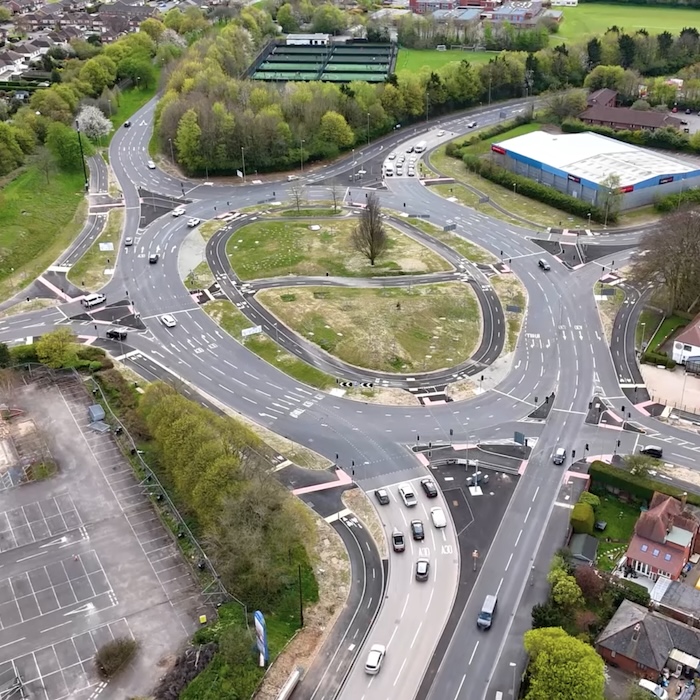 The Brighton Hill Roundabout. (Source: Auto Shenanigans)
The Brighton Hill Roundabout. (Source: Auto Shenanigans) 
 The proposed new block of flats in Riddlesdown Road, Purley (source:
The proposed new block of flats in Riddlesdown Road, Purley (source: 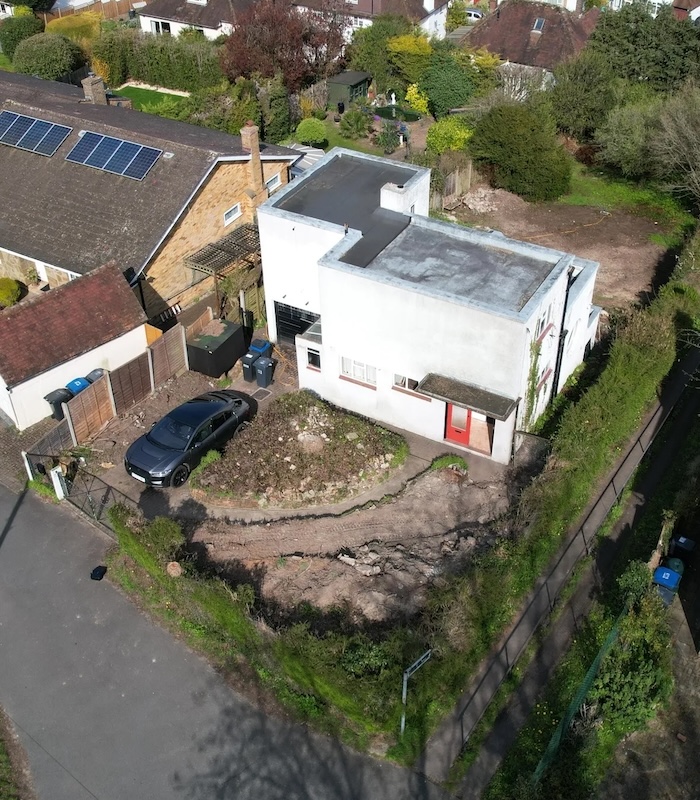 The current building at 79 Riddlesdown Road. (Source:
The current building at 79 Riddlesdown Road. (Source: 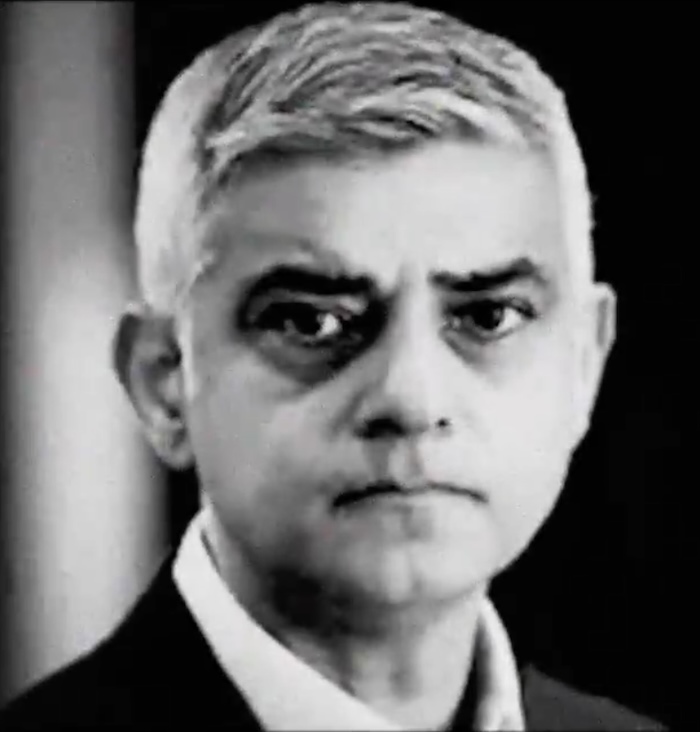 Sadiq Khan
Sadiq Khan  The Namazgah mosque in Tirana, Albania
The Namazgah mosque in Tirana, Albania 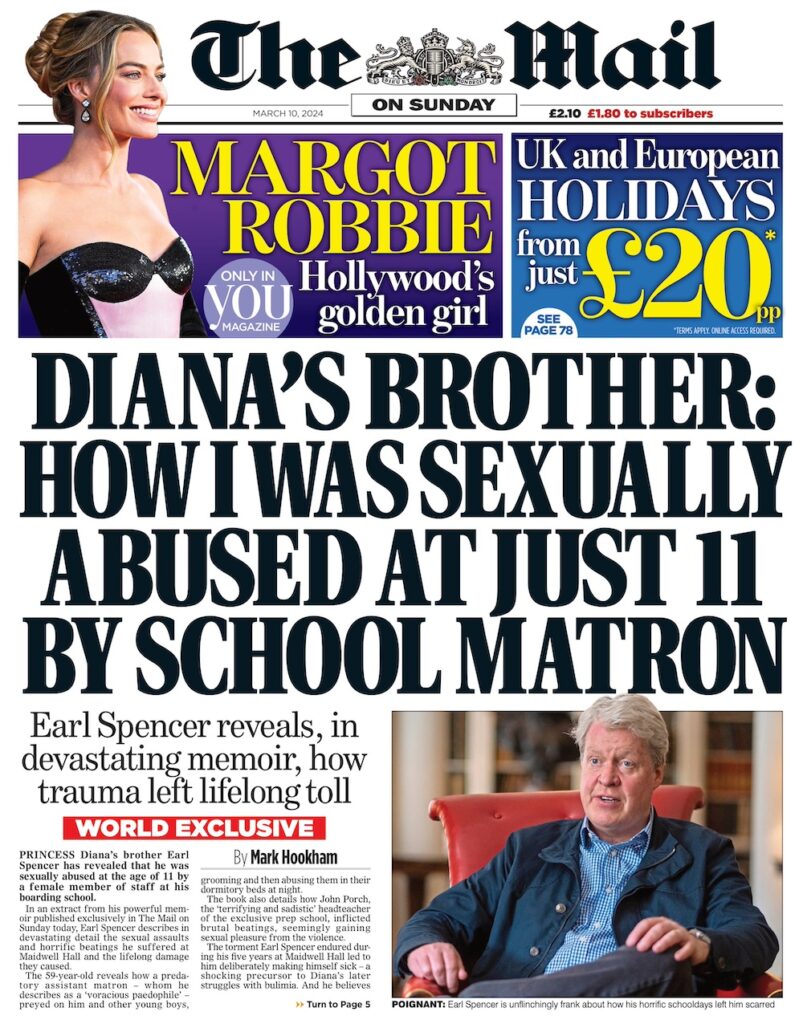
 Demonstrators in London, Nov 2023
Demonstrators in London, Nov 2023  A demonstration in London against the Gaza genocide in November 2023. (Taken by me.)
A demonstration in London against the Gaza genocide in November 2023. (Taken by me.) 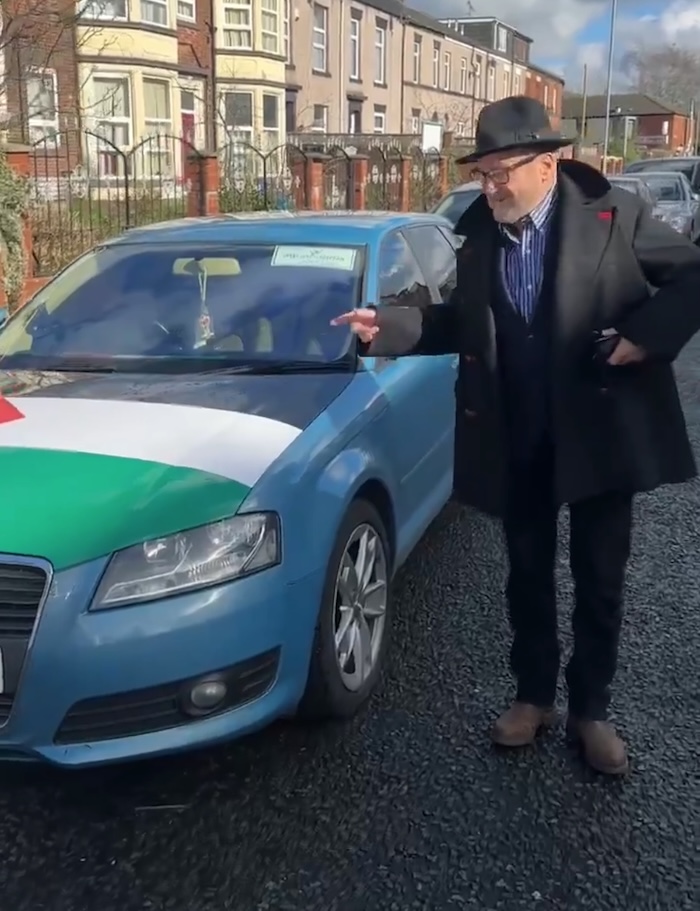 Galloway: “the best cars are to be found here in Rochdale”. (Source:
Galloway: “the best cars are to be found here in Rochdale”. (Source:  Brianna Ghey. (Image source: TikTok.)
Brianna Ghey. (Image source: TikTok.)  Hind Rajab, the six-year-old girl murdered by the Israelis who also murdered the two paramedics sent to her rescue. (Source:
Hind Rajab, the six-year-old girl murdered by the Israelis who also murdered the two paramedics sent to her rescue. (Source: 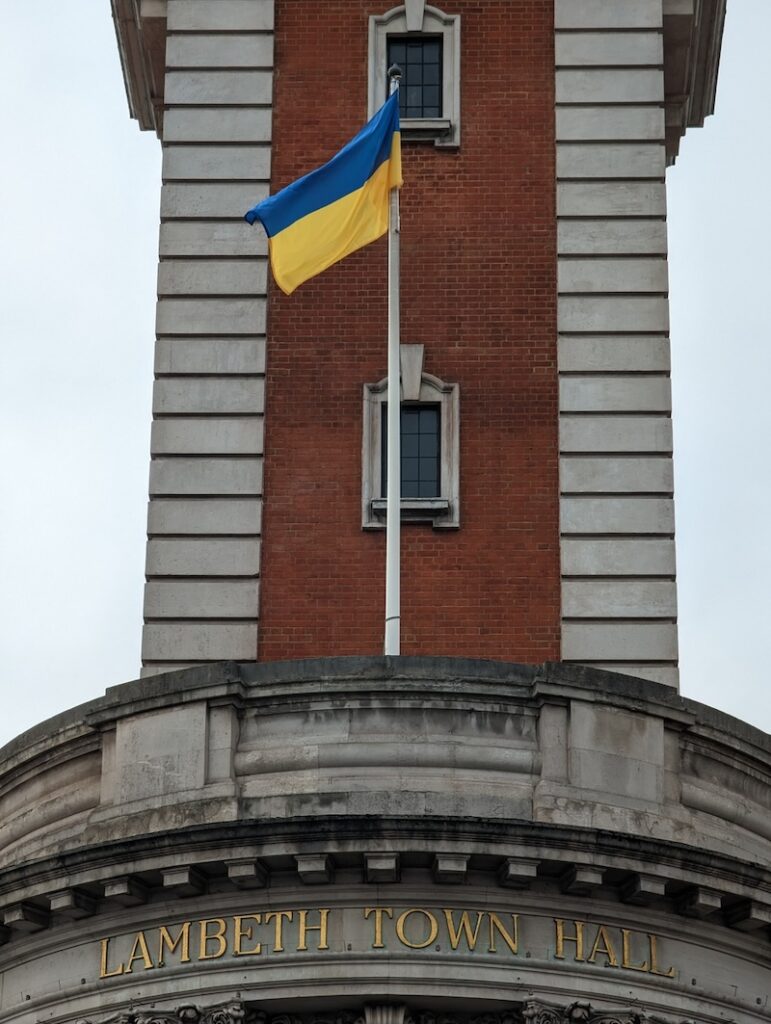 The Ukrainian flag flying outside Lambeth Town Hall, Feb 2023 (source:
The Ukrainian flag flying outside Lambeth Town Hall, Feb 2023 (source:  Satellite image of Michaela Community School. (Source: Google Maps)
Satellite image of Michaela Community School. (Source: Google Maps)  A speaker at a Hizb ut-Tahrir demonstration in London, October 2023
A speaker at a Hizb ut-Tahrir demonstration in London, October 2023  Metropolitan Correctional Center, New York
Metropolitan Correctional Center, New York